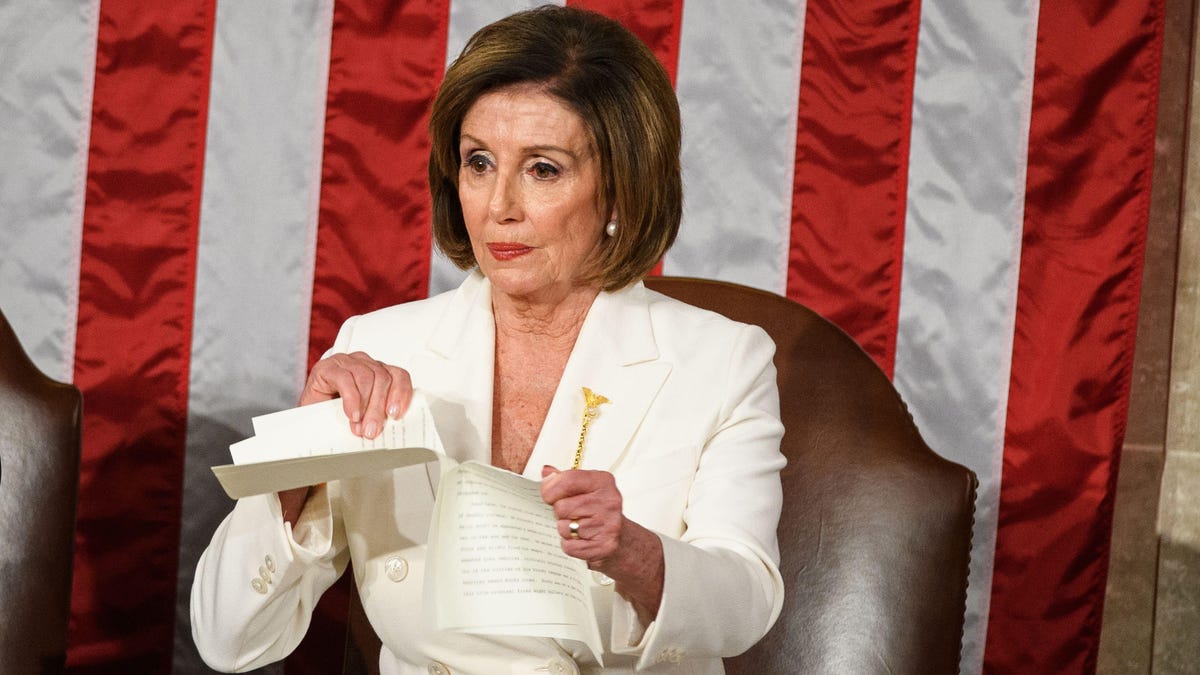Facebook, Twitter called on to ax edited clip of Pelosi tearing Trump speech
Some Democrats say the video is misleading. Twitter and Facebook say it doesn't violate their rules.

Speaker of the US House of Representatives Nancy Pelosi rips a copy of US President Donald Trump's speech after he delivers the State of the Union address on Feb. 4.
Facebook and Twitter refused to pull down an edited video posted by President Donald Trump that some Democrats said misleads viewers about when House Speaker Nancy Pelosi ripped up a copy of the president's State of the Union address, reigniting a debate about how social networks should handle manipulated media.
The roughly 5-minute video, posted on Trump's social media accounts, shows Pelosi tearing up the speech after Trump honored several Americans including a former Tuskegee Airman, a student receiving a scholarship and members of the US military. Pelosi, though, ripped up the speech after Trump concluded his address on Tuesday night.
Drew Hammill, Pelosi's deputy chief of staff, and several Democratic lawmakers called on social networks to pull down the video, saying it spreads misinformation, but Twitter and Facebook said it didn't violate their policies. The disagreement over whether the companies made the right call illustrates the challenges Facebook and Twitter face as they try to crack down on manipulated media. As of Friday afternoon, the video racked up nearly 4 million views on Twitter, more than 2 million views on Facebook and more than 4 million on Facebook-owned Instagram.
"The latest fake video of Speaker Pelosi is deliberately designed to mislead and lie to the American people, and every day that these platforms refuse to take it down is another reminder that they care more about their shareholders' interests than the public's interests," Hammill said in a tweet.
Facebook appears to disagree with that interpretation.
"Sorry, are you suggesting the President didn't make those remarks and the Speaker didn't rip the speech?," Facebook spokesman Andy Stone asked Hammill.
Another Twitter user chimed in, noting the video suggests that Pelosi tore up the speech when the Tuskegee Airman was introduced by Trump instead of at the end of the address.
Tim Murtaugh, a spokesman for Trump's presidential campaign, said in a statement that "If Nancy Pelosi fears images of her ripping up the speech, perhaps she shouldn't have ripped up the speech."
A watermark in the edited Pelosi video indicates that it was made by a conservative nonprofit.
It's the second time that both companies have been under pressure to take down a video that attacks Pelosi. In May, videos of Pelosi were doctored to make it seem as if she were slurring her words. YouTube, which has a policy against "deceptive practices," took the video down, but Twitter didn't. Facebook provided information from fact-checkers and slowed the spread of the video after it was posted by a group that had a Facebook page.
This time, though, the video went viral after it was shared directly by Trump's social media accounts. Facebook typically exempts politicians from fact-checking because the company considers their speech newsworthy. Facebook banned some doctored videos such as deepfakes but it doesn't include content that's been edited to change the order of words. Deepfakes are artificial intelligence-powered videos that make it seem like people are doing or saying something they didn't.
Twitter unveiled new rules against manipulated media this week, but the policy doesn't go into effect until March. It appears unlikely that the latest Pelosi video would be removed under those rules. Twitter said it wouldn't pull down manipulated media unless it was likely to cause serious harm such as threatening a person's safety. A company spokeswoman said the video posted by the president didn't go against any of Twitter's current policies. If a politician like Trump breaks its rules, the company would typically put a notice over the tweets, not remove them.
Google-owned YouTube said the Pelosi video also didn't violate its rules.
Concerned about the spread of misinformation, some Democratic lawmakers are still asking social networks such as Twitter to pull down the video. Rep. Ro Khanna, of California, said in a tweet that "social media platforms are a place where people come for news & information" and that "falsity has never been a part of our 1st Amendment tradition."

